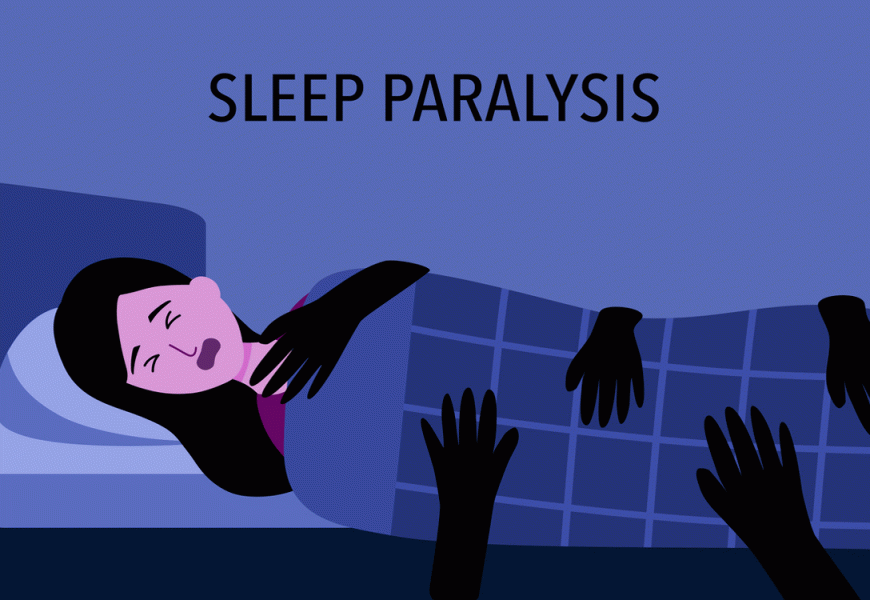Imagine waking up in the middle of the night, fully aware of your surroundings but completely unable to move or speak. You might feel a heavy pressure on your chest, sense an eerie presence in the room, or even experience vivid hallucinations. This unsettling phenomenon is known as sleep paralysis, and while it can be terrifying, it is usually harmless.
Sleep paralysis occurs when the body remains in a sleep-like state while the mind becomes conscious. It can last anywhere from a few seconds to a couple of minutes, leaving individuals feeling helpless and frightened. Understanding the causes, risk factors, and preventive measures can help reduce the frequency of these episodes and promote better sleep health.
What is Sleep Paralysis?
Sleep paralysis is a temporary inability to move or speak while transitioning between sleep and wakefulness. It happens when the brain wakes up from REM (rapid eye movement) sleep, but the body remains temporarily paralyzed. This state can be accompanied by hallucinations, difficulty breathing, and an overwhelming sense of fear.
Although sleep paralysis has been associated with supernatural experiences in many cultures, science has identified clear physiological reasons for it. It is not a sign of any serious medical condition, but it can be distressing for those who experience it frequently.
Causes of Sleep Paralysis
1. Disruptions in Sleep Cycle
An irregular sleep schedule is one of the most common triggers for sleep paralysis. People who frequently change their sleep patterns—such as shift workers, students pulling all-nighters, or those who travel across time zones—are more likely to experience disruptions in their sleep cycle. When sleep is inconsistent, the brain struggles to transition smoothly between different sleep stages, increasing the likelihood of sleep paralysis episodes. Ensuring a consistent bedtime and wake-up time can significantly reduce the risk.
2. Sleep Disorders
Certain sleep disorders, such as insomnia, narcolepsy, and obstructive sleep apnea, can contribute to sleep paralysis. Narcolepsy, a condition characterized by sudden sleep attacks, often leads to disrupted sleep patterns, making it more common for individuals with this disorder to experience sleep paralysis. Similarly, sleep apnea, which causes breathing interruptions during sleep, can lead to fragmented sleep, increasing the risk of experiencing paralysis upon waking. If sleep paralysis becomes frequent, it may be a sign of an underlying sleep disorder that requires medical attention.
3. High Levels of Stress and Anxiety
Mental health plays a significant role in sleep quality. High levels of stress, anxiety, and depression can interfere with sleep patterns, making sleep paralysis more likely. Stress causes the body to remain in a heightened state of alertness, which can disrupt REM sleep and lead to sleep paralysis. People experiencing emotional distress may also have more vivid and frightening hallucinations during these episodes. Practicing relaxation techniques, such as meditation, deep breathing, or journaling before bedtime, can help calm the mind and reduce stress-related sleep disturbances.
4. Sleeping Position
Research suggests that sleeping on your back (supine position) may increase the chances of experiencing sleep paralysis. This position can cause the tongue and throat muscles to relax too much, potentially leading to restricted airflow and disrupted sleep patterns. Additionally, lying on the back may contribute to a feeling of pressure on the chest, which is a common sensation during sleep paralysis episodes. If you frequently experience sleep paralysis, try sleeping on your side and using pillows to maintain a comfortable position throughout the night.
5. Genetic Factors
Genetics may also play a role in sleep paralysis. If you have family members who frequently experience sleep paralysis, you may be more likely to develop it yourself. While scientists are still studying the hereditary aspects of this condition, it is clear that some individuals are naturally more prone to experiencing sleep disturbances than others. Although you cannot change your genetic predisposition, maintaining good sleep hygiene can help reduce the occurrence of sleep paralysis.
6. Substance Use and Medications
The consumption of alcohol, caffeine, and certain medications can interfere with sleep quality and increase the risk of sleep paralysis. Stimulants like caffeine and nicotine can make it harder for the body to enter deep sleep, while alcohol can disrupt REM sleep cycles. Additionally, some antidepressants and medications that affect brain neurotransmitters may alter sleep patterns, leading to an increased likelihood of experiencing sleep paralysis. To improve sleep quality, limit the use of stimulants in the evening and consult a doctor if you suspect that your medications are affecting your sleep.
Risk Factors for Sleep Paralysis
While sleep paralysis can happen to anyone, certain factors make individuals more susceptible to experiencing it:
Young Adults: Sleep paralysis is most common in teenagers and young adults, particularly those between the ages of 18 and 30.
Irregular Sleep Schedules: People who work night shifts, travel frequently, or have inconsistent sleep patterns are at a higher risk.
High Stress Levels: Anxiety, depression, and emotional distress can increase the likelihood of experiencing sleep paralysis.
Sleep Disorders: Individuals with insomnia, narcolepsy, or sleep apnea have a higher chance of experiencing sleep paralysis.
Post-Traumatic Stress Disorder (PTSD): People who have experienced trauma or have recurring panic attacks are more likely to suffer from sleep disturbances, including sleep paralysis.
How to Prevent Sleep Paralysis
1. Maintain a Regular Sleep Schedule
One of the most effective ways to prevent sleep paralysis is to maintain a consistent sleep routine. Going to bed and waking up at the same time every day—even on weekends—helps regulate your body’s internal clock. Aim for 7–9 hours of uninterrupted sleep each night to ensure your body and mind get the rest they need. Avoid staying up too late, as sleep deprivation can increase the risk of sleep paralysis episodes.
2. Manage Stress and Anxiety
Since stress and anxiety are major triggers of sleep paralysis, finding healthy ways to manage them is crucial. Engage in relaxation techniques such as meditation, deep breathing, or progressive muscle relaxation before bedtime. Avoid overloading yourself with stressful tasks late at night, and consider speaking to a therapist if you’re experiencing chronic anxiety or depression. Keeping a journal to release your thoughts before sleep can also help reduce nighttime stress.
3. Improve Sleep Hygiene
Creating a calm and comfortable sleep environment can significantly reduce sleep disturbances. Keep your bedroom dark, quiet, and cool to promote restful sleep. Reduce screen time before bed—blue light from electronic devices can interfere with melatonin production and disrupt sleep patterns. Additionally, avoid caffeine, nicotine, and heavy meals close to bedtime, as they can make it harder to fall asleep and increase the risk of sleep paralysis.
4. Adjust Sleeping Position
If you frequently experience sleep paralysis, try sleeping on your side instead of your back. This simple change can help reduce the likelihood of experiencing an episode. You can use a body pillow to prevent yourself from rolling onto your back during the night. Experimenting with different sleep positions may help you find the most comfortable and stable posture for a restful night’s sleep.
5. Exercise Regularly
Regular physical activity can improve overall sleep quality and help prevent sleep paralysis. Engaging in moderate exercise during the day—such as walking, jogging, or yoga—promotes deeper sleep and reduces stress. However, avoid exercising too close to bedtime, as it can make it harder to fall asleep.
6. Seek Medical Advice if Needed
If sleep paralysis becomes frequent or starts affecting your daily life, it may be a sign of an underlying sleep disorder. Consulting a sleep specialist can help diagnose any potential issues and provide guidance on managing them. If necessary, your doctor may recommend lifestyle changes, therapy, or medical treatments to improve your sleep health.
Final Thoughts
While sleep paralysis can be a frightening experience, understanding its causes and risk factors can help reduce its occurrence. By maintaining a consistent sleep schedule, managing stress, and improving sleep hygiene, you can take control of your sleep health and prevent future episodes. If the problem persists, seeking professional advice can provide further insights into managing sleep paralysis effectively.
Prioritizing restful sleep is essential for both physical and mental well-being—take the necessary steps to ensure a peaceful and uninterrupted night’s rest.




